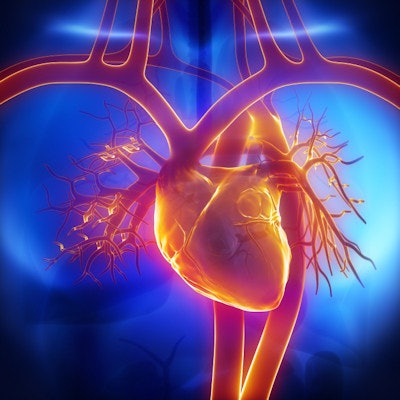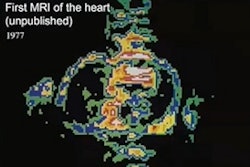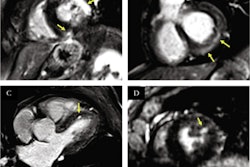
Cardiac MRI is the "technique of choice" for imaging suspected cardiac tumors, with a high accuracy rate and prognostic value, according to a study published September 21 in the European Heart Journal.
The findings suggest that cardiac MRI could improve patient care due to more accurate diagnoses, lead author Dr. Chetan Shenoy of the University of Minnesota Medical School in Minneapolis said in a statement released by the university on October 7.
"These data provide the first large-scale validation of the clinical practice of using cardiac MRI to exclude a cardiac tumor and to diagnose the type of tumor," Shenoy said. "By demonstrating high accuracy and long-term prognostic value, our results confirm that cardiac MRI can be used as a 'one-stop shop' for this clinical indication."
Cardiovascular MRI is an important tool for assessing patients with suspected heart tumors, and their treatment is shaped by the information the exam offers, the group noted. Typically, patients don't undergo further testing if cardiac MRI rules out a mass, but there have been no studies that confirm this approach.
Shenoy and colleagues conducted a study that included 903 patients who underwent cardiac MRI. Imaging results were categorized as no mass, pseudomass, thrombus, benign tumor, or malignant tumor; the team determined the final diagnosis after patient follow-up over about four years, with the study's primary endpoint all-cause mortality.
In patient cohort, cardiac MRI found the following:
- 25% of patients had no mass.
- 16% had pseudomasses.
- 16% had thrombus.
- 17% had benign tumor.
- 23% had malignant tumors.
The study found that, when compared with patients' final diagnosis, cardiac MRI diagnosis was accurate in 98.4% of study participants. It also showed that patients with pseudomasses and benign tumors had a similar mortality rate compared with those with no masses, while those with malignant tumors and thrombus had higher mortality rates. Of 903 patients, 376 died over a median follow-up period of 4.9 years -- roughly 41%, which corresponds to the percentage of patients with malignant tumors and thrombus.
The results highlight that "cardiac MRI diagnosis is a powerful independent predictor of mortality incremental to clinical risk factors," the group wrote.
"We anticipate our findings will shape future guidelines, appropriateness documents and health policies on this topic," Shenoy said in the university statement.





















